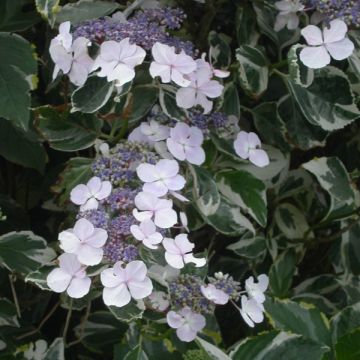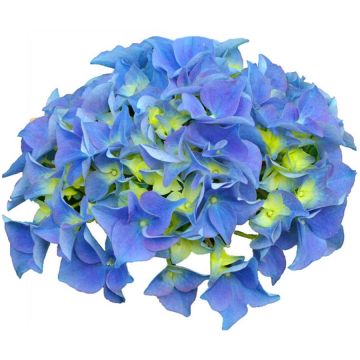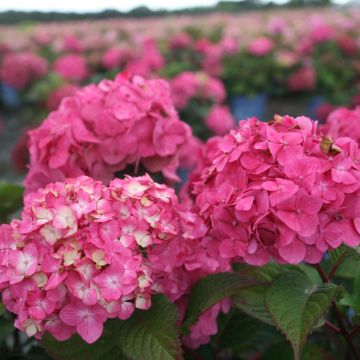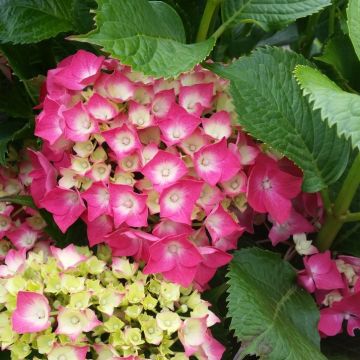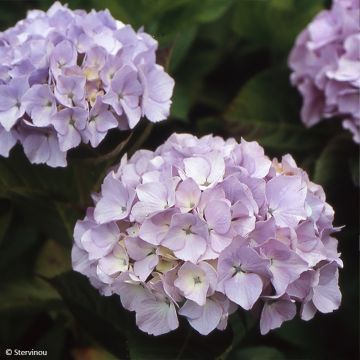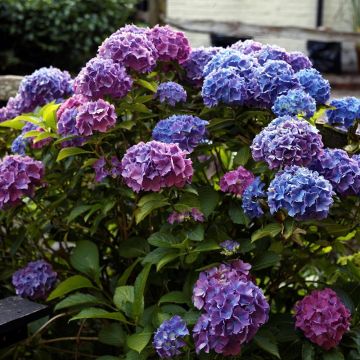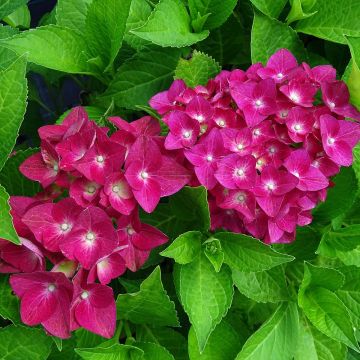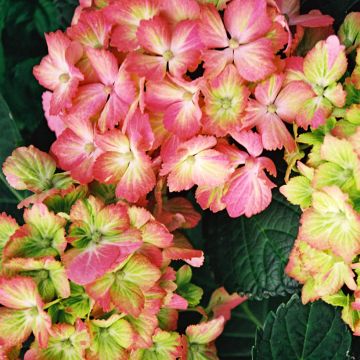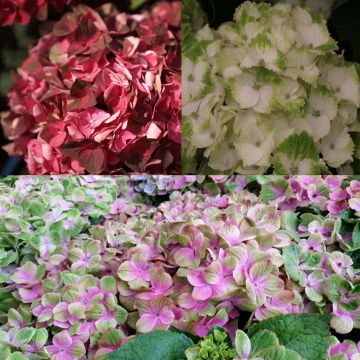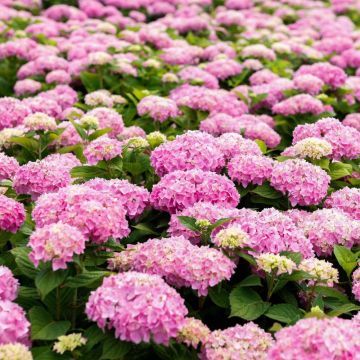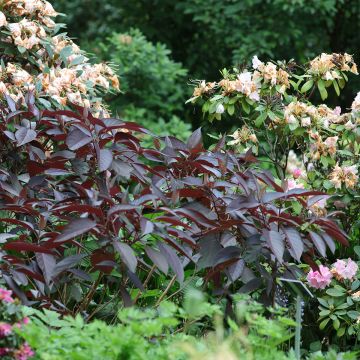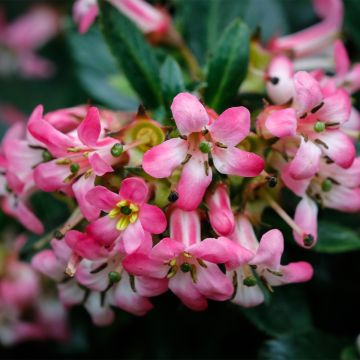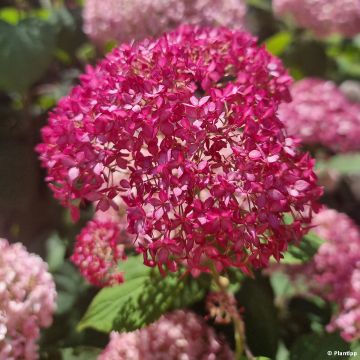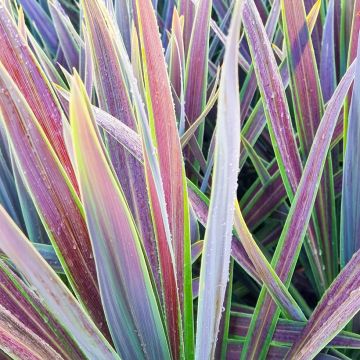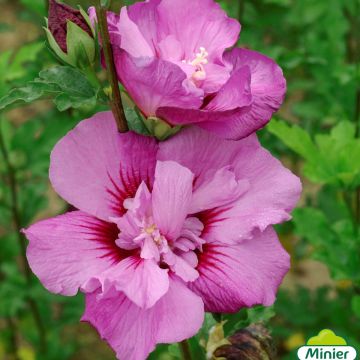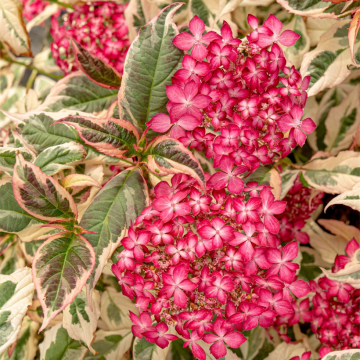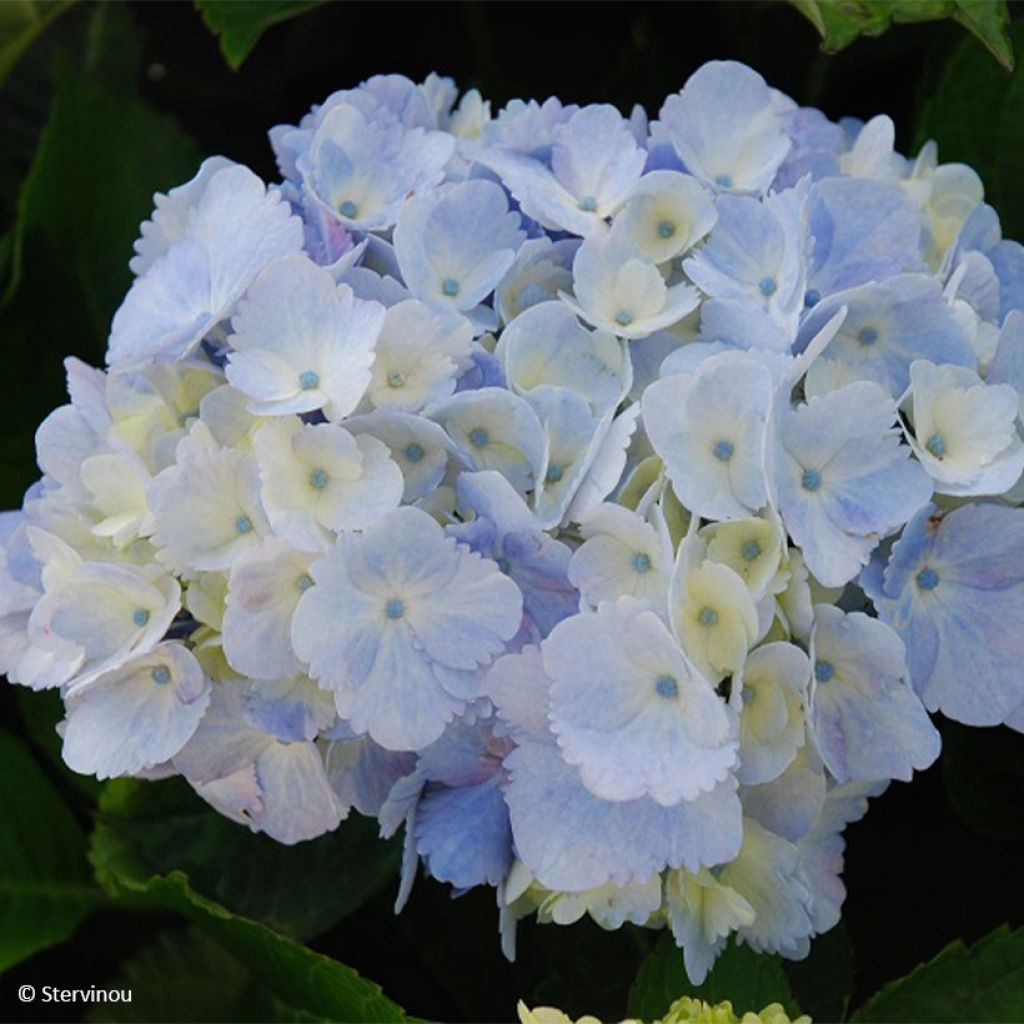

Hydrangea macrophylla Amethyst
Hydrangea macrophylla Amethyst
Hydrangea macrophylla Amethyst (Collection 1900)
Bigleaf Hydrangea, French Hydrangea, Lacecap Hydrangea, Mophead Hydrangea, Penny Mac, Hortensia
This item cannot be shipped to the selected country
Delivery charge from €5.90
More information
Schedule delivery date,
and select date in basket
This plant carries a 24 months recovery warranty
More information
We guarantee the quality of our plants for a full growing cycle, and will replace at our expense any plant that fails to recover under normal climatic and planting conditions.
From €5.90 for pickup delivery and €6.90 for home delivery
Express home delivery from €8.90.
Does this plant fit my garden?
Set up your Plantfit profile →
Description
Hydrangea macrophylla 'Amethyst' is an old English variety of hydrangea that is small in size, compact, with strong stems, and its large pastel flowers express all the charm of the Belle Époque era. Its inflorescences, filled with single to double florets, remain decorative until winter and are superb in fresh or dried bouquets. Their colour varies depending on the nature of the soil and fades beautifully: baby pink in non-calcareous garden soil, they will be light blue if the soil is acidic or if the bush benefits from a bluing treatment. Like all hydrangeas, it prefers moist, humus-bearing soils. It will make a big impact in a pot, on the terrace, or in partially shaded flower beds.
Hydrangea macrophylla 'Amethyst' is a horticultural creation by Haworth-Booth dating back to 1938. It is a hybrid obtained through the cross-breeding of hardy species and varieties belonging to the hydrangea family, native to China and Japan. This modest-sized bush has a dense and rounded habit, as wide as it is tall, reaching approximately 1m in all directions at maturity. It blooms in the second half of summer, starting from July. Its rounded, slightly flattened inflorescences, measure 14 to 19 cm in diameter. They are composed of single to double sterile florets with serrated petals. They quickly colour pink in neutral soil, mauve in slightly acidic soil, or blue in very acidic soil or soil rich in aluminium sulfate. In the end, the flowers will be green, speckled with pink or violet, depending on the soil. They are borne by very strong stems, one-year-old or older. The flowering is set against a beautiful light green, veined foliage that turns yellow in autumn before falling. The leaves are opposite, reaching about ten cm in length. They are simple, ovate to elliptical, ending in a tapered point, strongly toothed. Hydrangeas can live for at least 50 years.
The 'Amethyst' Hydrangea is a lovely variety to flower a shaded terrace, the corner of a porch, or a perennial flower bed sheltered from scorching sun. The macrophylla hydrangeas are well known for brightening the north side of houses. This one will thrive in a non-scorching east or west exposure, in partial shade. Although hydrangeas dislike limestone, they are not strictly speaking plants for ericaceous soil. Pair them with woody fuchsias, annual Impatiens, plant lilies and double tulips in front of their round silhouette. Enjoy their sumptuous flowering in the garden or in the house for a long time.
Report an error about the product description
Plant habit
Flowering
Foliage
Botanical data
Hydrangea
macrophylla
Amethyst (Collection 1900)
Hydrangéacées
Bigleaf Hydrangea, French Hydrangea, Lacecap Hydrangea, Mophead Hydrangea, Penny Mac, Hortensia
Cultivar or hybrid
Other Hydrangea Macrophylla
Planting and care
Plant the 'Amethyst' macrophylla hydrangea in spring or early autumn, preferably in a slightly shaded position, for example against an east-facing wall, or even north-facing. Protect it from cold and drying winds. It does not require ericaceous soil, but appreciates deep, moist, well-drained, fairly fertile soil, possibly enriched with a good base fertiliser before planting. If the soil is dry at the base of the wall, place the root ball at least 30-40 cm away and incorporate a quantity of well-decomposed compost to better retain moisture in the soil. It is hardy and able to be planted in a fairly cold region. Remove faded flowers on the first bud or on the pair of buds directly below. Cut back to the base a quarter or a third of the oldest stems, when the plant is mature, to promote the formation of young shoots. Carry out this pruning every year during March and April.
Planting period
Intended location
Care
This item has not been reviewed yet - be the first to leave a review about it.
Summer-flowering shrubs
Haven't found what you were looking for?
Hardiness is the lowest winter temperature a plant can endure without suffering serious damage or even dying. However, hardiness is affected by location (a sheltered area, such as a patio), protection (winter cover) and soil type (hardiness is improved by well-drained soil).

Photo Sharing Terms & Conditions
In order to encourage gardeners to interact and share their experiences, Promesse de fleurs offers various media enabling content to be uploaded onto its Site - in particular via the ‘Photo sharing’ module.
The User agrees to refrain from:
- Posting any content that is illegal, prejudicial, insulting, racist, inciteful to hatred, revisionist, contrary to public decency, that infringes on privacy or on the privacy rights of third parties, in particular the publicity rights of persons and goods, intellectual property rights, or the right to privacy.
- Submitting content on behalf of a third party;
- Impersonate the identity of a third party and/or publish any personal information about a third party;
In general, the User undertakes to refrain from any unethical behaviour.
All Content (in particular text, comments, files, images, photos, videos, creative works, etc.), which may be subject to property or intellectual property rights, image or other private rights, shall remain the property of the User, subject to the limited rights granted by the terms of the licence granted by Promesse de fleurs as stated below. Users are at liberty to publish or not to publish such Content on the Site, notably via the ‘Photo Sharing’ facility, and accept that this Content shall be made public and freely accessible, notably on the Internet.
Users further acknowledge, undertake to have ,and guarantee that they hold all necessary rights and permissions to publish such material on the Site, in particular with regard to the legislation in force pertaining to any privacy, property, intellectual property, image, or contractual rights, or rights of any other nature. By publishing such Content on the Site, Users acknowledge accepting full liability as publishers of the Content within the meaning of the law, and grant Promesse de fleurs, free of charge, an inclusive, worldwide licence for the said Content for the entire duration of its publication, including all reproduction, representation, up/downloading, displaying, performing, transmission, and storage rights.
Users also grant permission for their name to be linked to the Content and accept that this link may not always be made available.
By engaging in posting material, Users consent to their Content becoming automatically accessible on the Internet, in particular on other sites and/or blogs and/or web pages of the Promesse de fleurs site, including in particular social pages and the Promesse de fleurs catalogue.
Users may secure the removal of entrusted content free of charge by issuing a simple request via our contact form.
The flowering period indicated on our website applies to countries and regions located in USDA zone 8 (France, the United Kingdom, Ireland, the Netherlands, etc.)
It will vary according to where you live:
- In zones 9 to 10 (Italy, Spain, Greece, etc.), flowering will occur about 2 to 4 weeks earlier.
- In zones 6 to 7 (Germany, Poland, Slovenia, and lower mountainous regions), flowering will be delayed by 2 to 3 weeks.
- In zone 5 (Central Europe, Scandinavia), blooming will be delayed by 3 to 5 weeks.
In temperate climates, pruning of spring-flowering shrubs (forsythia, spireas, etc.) should be done just after flowering.
Pruning of summer-flowering shrubs (Indian Lilac, Perovskia, etc.) can be done in winter or spring.
In cold regions as well as with frost-sensitive plants, avoid pruning too early when severe frosts may still occur.
The planting period indicated on our website applies to countries and regions located in USDA zone 8 (France, United Kingdom, Ireland, Netherlands).
It will vary according to where you live:
- In Mediterranean zones (Marseille, Madrid, Milan, etc.), autumn and winter are the best planting periods.
- In continental zones (Strasbourg, Munich, Vienna, etc.), delay planting by 2 to 3 weeks in spring and bring it forward by 2 to 4 weeks in autumn.
- In mountainous regions (the Alps, Pyrenees, Carpathians, etc.), it is best to plant in late spring (May-June) or late summer (August-September).
The harvesting period indicated on our website applies to countries and regions in USDA zone 8 (France, England, Ireland, the Netherlands).
In colder areas (Scandinavia, Poland, Austria...) fruit and vegetable harvests are likely to be delayed by 3-4 weeks.
In warmer areas (Italy, Spain, Greece, etc.), harvesting will probably take place earlier, depending on weather conditions.
The sowing periods indicated on our website apply to countries and regions within USDA Zone 8 (France, UK, Ireland, Netherlands).
In colder areas (Scandinavia, Poland, Austria...), delay any outdoor sowing by 3-4 weeks, or sow under glass.
In warmer climes (Italy, Spain, Greece, etc.), bring outdoor sowing forward by a few weeks.

































